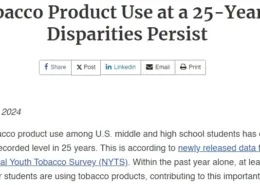Panama: Surge in Smuggled E-Cigarettes
Panama is currently facing a surge in the smuggling of e-cigarettes and other non-combustible devices, despite the existence of Law 315, which bans their sale and distribution. These products remain widely available and easily accessible in the country, indicating a growing demand. This revelation comes from an investigation conducted by research firm Povaddo, titled “Prevention of Illicit Trade: Non-combustible Alternatives in Panama,” carried out from November 19 to December 23, 2022. Interestingly, Panama is also preparing to host the World Health Organization’s Framework Convention on Tobacco Control (COP10) and the third session of the Meeting of the Parties (MOP3) on the Protocol to Eliminate Illicit Trade in Tobacco Products, highlighting the significance of this issue.
Alarming Statistics
According to the results of a consumer survey, e-cigarette usage accounts for 5% of the adult population in Panama, which equates to approximately 200,000 users. Furthermore, there is a consistent flow of sales from both retailers and resellers. This prevalence is significantly higher than the figures reported in the National Health Survey of 2019 and the World Health Organization’s basic survey of 2020 for Panama. It suggests that Law 315 has failed to effectively reduce the consumption of non-combustible products.
The National Health Survey of Panama conducted in 2019 revealed that only 0.4% of Panamanians had used smoke-free devices in the 30 days prior to the survey. The survey also indicated an average usage rate of 0.8% among men and 0.1% among women.
In the World Health Organization’s basic survey in 2020, it was found that 0.8% of Panamanians used non-combustible products, with an average of 1% among men and 0.5% among women. Additionally, the research highlighted that 6.1% of the general population used tobacco products, with an average of 9.4% among men and 2.8% among women.
The Growing Consumption Trend
The consumer survey demonstrated that disposable devices are highly popular among non-combustible alternative users in Panama. Around 38% of consumers of these alternatives prefer disposable vapes. Furthermore, survey respondents who reported having family or friends using e-cigarettes stated that over 41% of these acquaintances use disposable vapes.
Another 39% of consumers using electronic systems indicated that they use devices with pods or cartridges. Further analysis of the survey revealed some confusion among electronic system consumers regarding the specific type of e-cigarette they use, ultimately confirming that disposables are indeed the most common device type.
In-depth interviews with industry experts further confirmed that e-cigarettes are the most widespread category of non-combustible alternatives in Panama. However, there is a very low prevalence of heated tobacco consumers, as the interviewees displayed limited familiarity with these products. The experts believe that disposable vapes constitute the most common type of e-cigarettes on the market.
The Popularity of Disposable Vapes
During the in-depth interviews and store audits, it was observed that the most prevalent e-cigarette brands are predominantly disposable devices. Although some of these brands were also mentioned in the consumer survey, they were often cited by electronic system consumers claiming to use e-cigarettes with pods and cartridges.
Overall, the most commonly observed device type during store audits was the disposable vape, which offers approximately 2,500 puffs and is priced around $15. More advanced devices, such as e-cigarettes with pods and open system devices, are less prevalent and more expensive, with prices ranging between $20 and $75.
A significant finding from the investigation is that the majority of disposable vapes from the most popular vape brand in Panama, identified and reviewed during the inquiry, turned out to be counterfeit devices. The codes/SKU of these products did not match the official brand’s website.
Online stores and sellers on social networks have emerged as major sales channels for these products, gaining popularity among vape consumers following the approval of Law 315.
Entry Points and Regulatory Inconsistency
China, the United States, Europe (particularly Spain or Switzerland), and Mexico serve as the main countries of origin for these smuggled products. The ports of entry into Panama are primarily the United States, Colombia, and Costa Rica.
Additionally, small quantities of non-combustible alternative products are imported by international travelers arriving in Panama, declaring them for personal use. The Colon Free Zone plays a crucial role in the smuggling of illicit cigarettes into Panama. Interestingly, unlike the rest of Panama, non-combustible alternative products are not banned in this area, highlighting a regulatory inconsistency that creates an ideal scenario for the black market of electronic cigarettes.
Law 315 and Consumer Risk
Industry experts consulted believe that Law 315 acted as a catalyst, leading to the emergence of a significant illicit market for electronic cigarettes. This situation is exacerbated by the prevalence of harmful counterfeit devices. Some of these illicit devices are untested copies of legitimate brands, posing potential risks to consumers.
Experts argue that the harmful element of smoking lies in combustion rather than nicotine itself. However, combustible cigarettes continue to be permitted, leading to the unintended consequence of expanding the field of action for criminal organizations involved in illicit trading within and from Panama. This viewpoint is supported by Tomas Sanchez, President of the Association for Harm Reduction from Tobacco in Panama. Alejo Campos from Crime Stoppers Caribbean, Bermuda, and Latin America further asserts that this prohibition will only provide criminal organizations with another commodity to illicitly trade.
- Kazakhstan Seizes 150k Illegal Vapes in Almaty Raid - July 30, 2025
- Brazil Police Crack Down on E-Cigarette Smuggling - July 30, 2025
- Experts Urge South Africa to Adopt Science-Based Vape Policies - July 30, 2025






